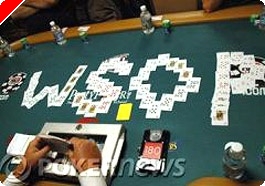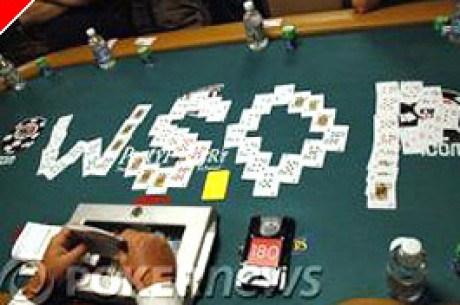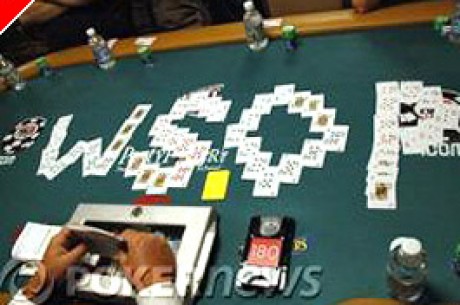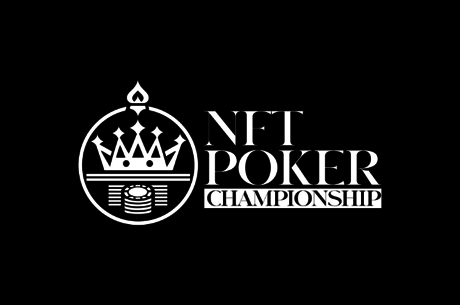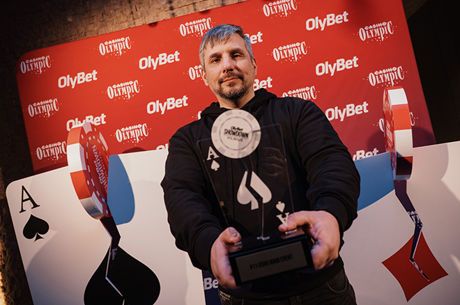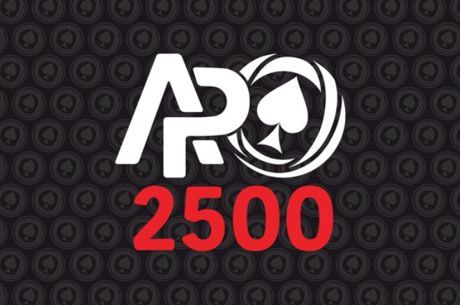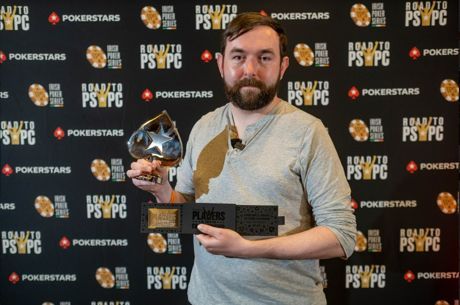The WSOP Academy: Cultivating Poker Dreams
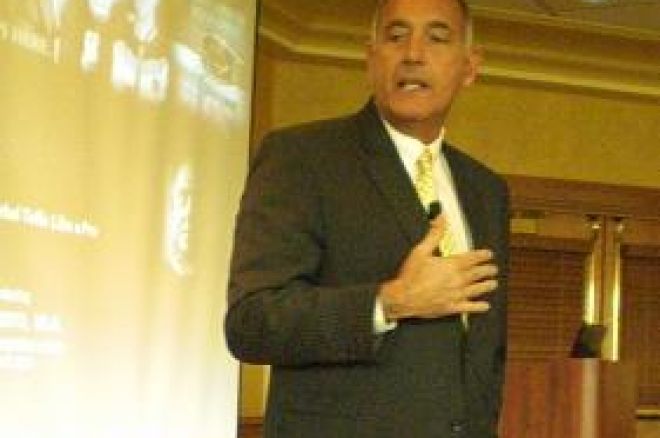
It's a little after nine on a Saturday morning in the Olympus Ballroom on the second floor of the Caesars Indiana Hotel & Casino, and the WSOP Academy is in town. 60 or so poker aspirants have gathered here, in a quietly overstated, upscale conference room, as the latest attendees of one of the WSOP Academy poker camps. The attendees sign in, get their tags, the course outline, and a "goody bag" of poker items, then slowly settle in around the available seating — five foldout poker tables and a back row of more traditional conference tables, all focused on a overhead screen and podium facing the group. It's way early by poker standards, but the group is serious about the game, mostly awake, and ready to learn.
One by one the lecturers conducting this seminar drift in as well. WSOP Academy camps offer a rotating pool of instructors, usually four well-known names per stop. Here the seminar will be led by Alex Outhred, a solid pro who's notched a televised World Poker Tour final table and has had his moment of mainstream fame as well, appearing on "Are You Smarter Than a 5th Grader?"
Outhred, who sports a full beard and a grey cloth flatcap throughout the weekend, is the ringmaster at the WSOP Academy seminars. He's taught at 40 or so of the camps, dating from its original "Camp Hellmuth" days, and he's joined here by several other big names. Joe Navarro, the FBI behavioral analysis specialist and the author of Read 'Em and Reap, is another regular who appears at virtually every WSOP Academy stop. His extended talk on behavioral tells is perhaps the most distinctive content the WSOP Academy provides and a linchpin of the camp's appeal.
Mark Seif is here as well. The two-time WSOP bracelet winner has appeared at 20 or so of the WSOP Academy stops, and has plenty to offer to the attendees. Seif's a licensed attorney and an animated and practiced speaker, skills he'll put to good use during the various presentations. The fourth instructor at this camp is Paul "Kwickfish" Wasicka, a young pro with an already impressive poker resume, including his 2006 WSOP Main Event runner-up finish (to Jamie Gold) and his victory in the 2007 NBC National Heads-Up Poker Championship. This camp marks Wasicka's debut as a WSOP Academy instructor. The night before, Wasicka, with over $7 million in tournament earnings in the last two years, settled in for some fun at a $1/2 NL game in the Caesars Indiana room. It's that type of weekend, friendly and enjoyable on all counts.
WSOP Academy attendees, as a group, tend to be older and upscale. This group is no exception. The average age here is north of 40, with several couples and one three-generational family (the Walats – mother, son and grandson) in attendance. Camp organizer Brandon Rosen noted that father/son and husband/wife packages are quite common, with interested attendees often making the camp the centerpiece of a poker trip. The three-generational group isn't close to a record; Rosen, the camp founder who handles all the technical aspects of the seminars, noted that at the first Caesars Indiana stop there was one six-member, three-generation group on hand for the weekend. Nine of the 62 attendees are women. Not only is that a good growth indicator for the game, but Rosen noted that, "This is low. We're regularly getting 20% women."
Rosen also noted that the younger, Internet-centric players are infrequent attendees at WSOP Academy camps, which isn't surprising since live play, particularly in tournaments, is the focus here. As Rosen noted, older players also tend to place higher value on the social, interactive elements of the game, and the open interaction here with the pros and other aspiring players is one of the camp's biggest selling points. Nor are all the attendees from the immediate area; perhaps half have traveled six or more hours to take part in the camp. Several are return attendees (who receive discounts), such as Elizabeth Cheesman of Carmel, IN, who first attended the camp with her husband and then received this seminar's admission as a gift. Rosen says about 10% of attendees, on average, will return to the WSOP Academy experience a second time.
The camp includes an inspirational story as well, when Rosen introduces John Kriesel, a National Guard servicemen wounded by a roadside bomb in Iraq. Three of Kriesel's patrol were killed by the bomb, while Kriesel himself lost his legs, suffered arm and abdominal wounds, and barely survived the incident. Kriesel's passion, as Rosen described it, was to learn to "play competitive poker," and it's a passion that all attendees shared.
The seminar starts with Outhred working the first few screens of the seminar overview, the overhead companion to the guide given to each attendee. That's the format for the school, with each screen (or series of related screens) examining a central poker theme and serving up several bullet points, each of which is then explained more fully. The morning starts out with some of the most basic elements of poker, and then branches off into deeper areas as the weekend progresses.
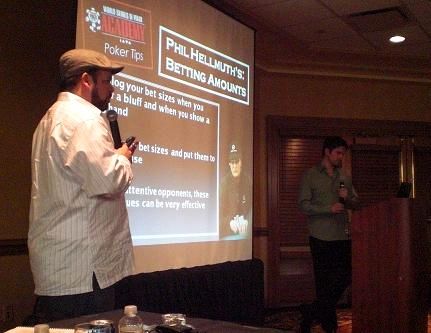
Alex Outhred and Paul Wasicka answer an attendee's question at a recent WSOP Academy poker seminar
Rosen notes that the camp is pitched as being for "intermediate" or "high intermediate" players, and that's a pretty apt description. A dedicated book studier who has a deep poker library likely already has as much or more raw poker teaching at his fingertips; at one point, while Wasicka is at the podium, the topic of poker books comes up, with the consensus from Wasicka and the other pros revealing nothing surprising. Doyle Brunson's Super/System gets a mention, as does Sklansky, as do the Harrington books. Still, there are several ways to learn how to improve one's poker game, and the WSOP Academy takes its own, interactive tack.
Interaction is the key. Attendees are invited to ask questions throughout, and in fact the instructors are so eager and earnest in their attempts to explain the poker concepts that the seminar itself tends to run over its own listed schedule. Nor do the pros pretend that their personal opinion on a given topic is always the sole, correct way to play; as the weekend goes on, a few of the differences between more conservative players such as Outhred and self-described "reformed aggro player" Wasicka, compared against the more notably aggressive Seif, liven up the discussions considerably. "I don't agree with this at all!" says Seif. "Let's just cross that right out of there." Seif probably gets in more good one-liners through the course of the weekend than any of the others, though each has their moments. Seif's analogy of attacking a weak player as "culling a baby wildebeest from the herd" is one of the biggest laugh-drawers of Day 1.
And then there's Joe Navarro, the FBI agent whose work on behavioral tells is so distinctive and groundbreaking that he's been a fixture at these camps since their inception. Navarro's Read 'Em and Reap is an indispensable niche book for the live poker player, as unique and important in its presentation as Caro's Book of Poker Tells was years earlier. If books of this nature have an inherent problem, it's applying the knowledge that's contained within. Navarro's two-and-a-half-hour Saturday afternoon session goes well beyond what his book offers, and then delves into real-life, interactive examples, along with techniques that poker players should learn just to help make themselves more observant. Navarro's talk is sprinkled with talk of famous, profitable players who have blatant tells and still don't change them. It's hard not to think that if great players have tells this bad – and examples are shown on film clips – then deciphering average opponents ought to be that much easier.
Both days of the seminar also feature "lab" time, when the players are split between lunch and lab sessions and are dealt instructional hands by the pros. Here, Outhred, Seif and Wasicka manned the tables and dealt out the hands themselves, going through each hand step-by-step and critiquing players' decisions. It's a neat concept, even though it does tend to bog down a bit – it's when the varying skill levels of the attending players become most evident. The result is that each pro only gets in only four or five hands before rotating through to the next group, though the hands that are played almost always have two or three inflection points where the pro can offer valuable insight, on bet sixing, stealing and so on.
Saturday night at this WSOP Academy is tournament night – it's when the players take what they've learned and try to win a seat into the WSOP-C Caesars Indiana Main Event coming up in mid-April. Smaller prizes are up for grabs as well. The pros take part in the tourney, serving as bounties, except for Navarro, who wanders behind the action in a roped-off area of the Caesars Indiana poker room and takes notes on students' tells to follow up on in the Sunday session. Outhred wins the tourney and successfully defends his bounty, so all the prizes are shuffled down a notch.
Sunday brings a renewed energy at the seminars Day 2. It's more give-and-take with Outhred, Seif and Wasicka, followed by more lab time. The previous night's tourney gets a brief review before the talks move into more specialized poker topics, such as changing gears, appropriate stealing and bluffing, and proper calculation of pot odds. One attendee asks if needing to calculate pot odds is really that important, to which Outhred replies, "It's about as important as believing in Jesus if you're a Christian." Once the laughs subside, it's on to why it's important. Then other topics, including changing gears, deep-stack and short-stack plays, and tournament stages get attention. The curriculum has a practiced formula of topics to cover, even if they never quite do get to them all.
Well past the official closing time for the seminar, the group finally calls things to a close. The pros remain around, answering questions, signing the occasional autograph… in no big hurry, it seems, to quit the scene. Each has been as eager to teach as the students have been willing to learn. The pros' sincerity has been one of the most distinctive elements of the weekend, just as the students' willingness to absorb as much poker learning as possible over two speedy days has been constantly on display. Worth it? The attendees certainly think so. It's up to them, now, to take the knowledge they've gained and improve their games, to make the camp just another investment on the way to being a winning player.

